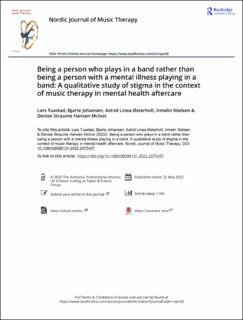| dc.contributor.author | Tuastad, Lars | |
| dc.contributor.author | Johansen, Bjarte | |
| dc.contributor.author | Østerholt, Astrid Linnea | |
| dc.contributor.author | Nielsen, Irmelin | |
| dc.contributor.author | Mcivor, Denise Straume Hansen | |
| dc.date.accessioned | 2022-09-30T12:12:28Z | |
| dc.date.available | 2022-09-30T12:12:28Z | |
| dc.date.created | 2022-09-01T13:38:08Z | |
| dc.date.issued | 2022 | |
| dc.identifier.issn | 0809-8131 | |
| dc.identifier.uri | https://hdl.handle.net/11250/3022916 | |
| dc.description.abstract | Introduction
The study explores the theme “stigma” and how it was experienced by participants in MOT82, a music therapy project in the field of mental health aftercare in Norway. The theme is explored through the research questions: How is stigmatisation experienced by participants in a music therapy project in the field of mental health in aftercare? And: Which strategies can be used to prevent stigma in the context of music therapy in mental health aftercare?
Method
The method for the study is based on User Interviewing User, a method for evaluation of health services, where the service users are actively involved in the entire research process. The analyses were qualitative processes within a hermeneutic abductive approach highlighting reflexivity as an important part of the research process.
Results
The participants in the study expressed MOT82 to be a positive arena that fostered experiences of mastery, personal development, inclusion, and a strong collaborative community. However, the participants also highlighted the theme of stigma, expressed through stories about mechanisms of exclusion; negative processes of labelling; and how stigma could be related to issues concerning illness, health, and treatment.
Discussion
Findings related to the theme of stigma are discussed and illuminated by theory from sociology, music therapy, stigma research and recovery; emphasising the concepts of social capital, performance and the importance of a user perspective. With regards to the matter of destabilising stigma, the message from the participants in MOT82 is clear: Tone down the focus on mental illness, turn up the volume regarding the importance of doing music. | en_US |
| dc.language.iso | eng | en_US |
| dc.publisher | Taylor & Francis | en_US |
| dc.rights | Attribution-NonCommercial-NoDerivatives 4.0 Internasjonal | * |
| dc.rights.uri | http://creativecommons.org/licenses/by-nc-nd/4.0/deed.no | * |
| dc.title | Being a person who plays in a band rather than being a person with a mental illness playing in a band: A qualitative study of stigma in the context of music therapy in mental health aftercare | en_US |
| dc.type | Journal article | en_US |
| dc.type | Peer reviewed | en_US |
| dc.description.version | publishedVersion | en_US |
| dc.rights.holder | Copyright 2022 The Author(s) | en_US |
| cristin.ispublished | true | |
| cristin.fulltext | original | |
| cristin.qualitycode | 2 | |
| dc.identifier.doi | 10.1080/08098131.2022.2075437 | |
| dc.identifier.cristin | 2047907 | |
| dc.source.journal | Nordic journal of music therapy | en_US |
| dc.identifier.citation | Nordic journal of music therapy. 2022. | en_US |

